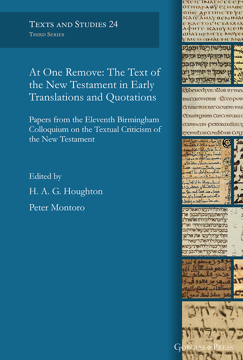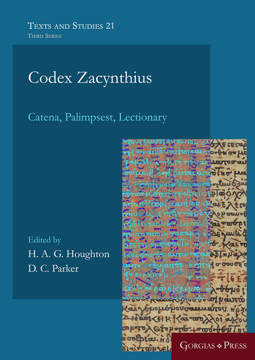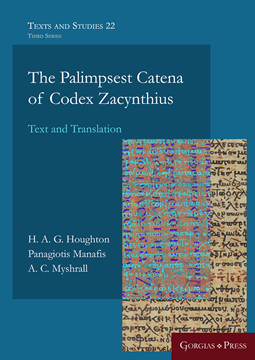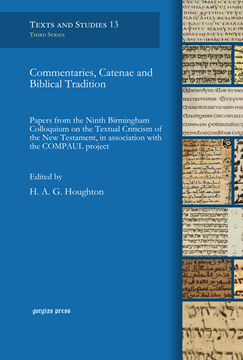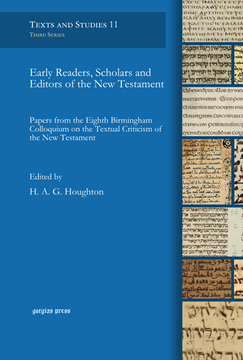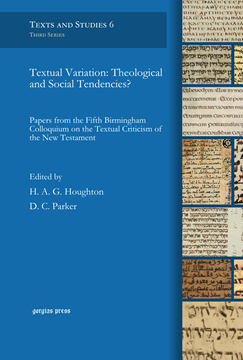H. A. G. Houghton

H.A.G. Houghton is Professor of New Testament Textual Scholarship and Director of the Institute for Textual Scholarship and Electronic Editing at the University of Birmingham. He is currently principal investigator of the CATENA project and co-investigator of the Codex Zacynthius project, as well as serving as executive editor of the Pauline Epistles for the International Greek New Testament Project.
At One Remove
The Text of the New Testament in Early Translations and Quotations
Edited by H. A. G. Houghton & Peter Montoro
Series: Texts and Studies (Third Series) 24
ISBN: 978-1-4632-4109-4
Indirect evidence, in the form of early translations (‘versions’) and biblical quotations in ancient writers (‘patristic citations’), offers important testimony to the history and transmission of the New Testament. In addition to their value as early evidence for the Greek New Testament, versions have a textual tradition of their own which is often of considerable historical, theological and ecclesial significance. This volume brings together a series of original contributions on this topic, which was the focus of the Eleventh Birmingham Colloquium on the Textual Criticism of the New Testament. The research described here illustrates not just the ongoing importance and variety of this material, but also the way in which it may shape the theory and practice of text-critical scholarship and lead to new insights about this vast and rich tradition.
$158.00 (USD) $94.80 (USD)
Codex Zacynthius
Catena, Palimpsest, Lectionary
Edited by H. A. G. Houghton & David C. Parker
Series: Texts and Studies (Third Series) 21
ISBN: 978-1-4632-4107-0
This book consists of a series of studies of Codex Zacynthius (Cambridge, University Library MS Add. 10062), the earliest surviving New Testament commentary manuscript in catena format. A research project funded by the UK Arts and Humanities Research Council has produced new multispectral images of the palimpsest undertext in order to enable a thorough investigation of the manuscript and the creation of a complete electronic edition. This volume, co-authored by the members of the project, will provide a full account of the research undertaken by the project. Many advances have resulted from this research, which will be presented here for the first time in print.
$146.00 (USD) $87.60 (USD)
The Palimpsest Catena of Codex Zacynthius
Series: Texts and Studies (Third Series) 22
ISBN: 978-1-4632-4105-6
This book is the first-ever edition of the complete palimpsest undertext of Codex Zacynthius (Cambridge, University Library MS Add. 10062), the earliest surviving New Testament commentary manuscript in catena format. It relies on new multispectral images produced by a research project funded by the UK Arts and Humanities Research Council in 2018.
$146.00 (USD) $87.60 (USD)
Liturgy and the Living Text of the New Testament
Papers from the Tenth Birmingham Colloquium on the Textual Criticism of the New Testament
Edited by H. A. G. Houghton
Series: Texts and Studies (Third Series) 16
ISBN: 978-1-4632-0748-9
The textual history of the New Testament is a dynamic tradition, reflecting differing readings, interpretations and uses of its canonical writings. These contributions represent original research by an international range of scholars, first presented at the Tenth Birmingham Colloquium on the Textual Criticism of the New Testament.
$114.95 (USD) $68.97 (USD)
Commentaries, Catenae and Biblical Tradition
Papers from the Ninth Birmingham Colloquium on the Textual Criticism of the New Testament, in association with the COMPAUL project
Edited by H. A. G. Houghton
Series: Texts and Studies (Third Series) 13
ISBN: 978-1-4632-0576-8
This collection of original research papers examines early commentaries on the New Testament and the transmission of the biblical text. Focusing principally on Greek and Latin tradition, it provides new insights into the sources and manuscripts of commentators and catenae.
$175.00 (USD) $105.00 (USD)
Early Readers, Scholars and Editors of the New Testament
Papers from the Eighth Birmingham Colloquium on the Textual Criticism of the New Testament
Edited by H. A. G. Houghton
Series: Texts and Studies (Third Series) 11
ISBN: 978-1-4632-0411-2
A collection of ten original papers on the New Testament text, first presented in 2013, which reflect the diversity of current research. Examples of ancient engagement with the Bible include Origen, Eusebius of Caesarea and Augustine along with early translations.
$141.00 (USD) $84.60 (USD)
Theological and Social Tendencies?
Papers from the Fifth Birmingham Colloquium on the Textual Criticism of the New Testament
Edited by H. A. G. Houghton & David C. Parker
Series: Texts and Studies (Third Series) 6
ISBN: 978-1-59333-789-6
Did scribes intentionally change the text of the New Testament? This book argues they did not and disputes the claims that variant readings are theologically motivated. Using evidence gathered from some of the earliest surviving biblical manuscripts these essays reconstruct the copying habits of scribes and explore the contexts in which they worked. Alongside these are studies of selected early Christian writings, which illustrate attitudes to and examples of textual change.
$135.00 (USD) $81.00 (USD)

